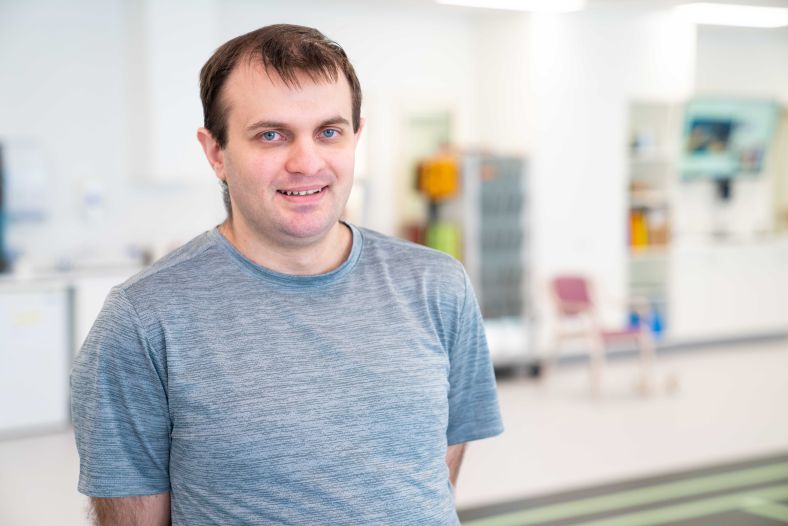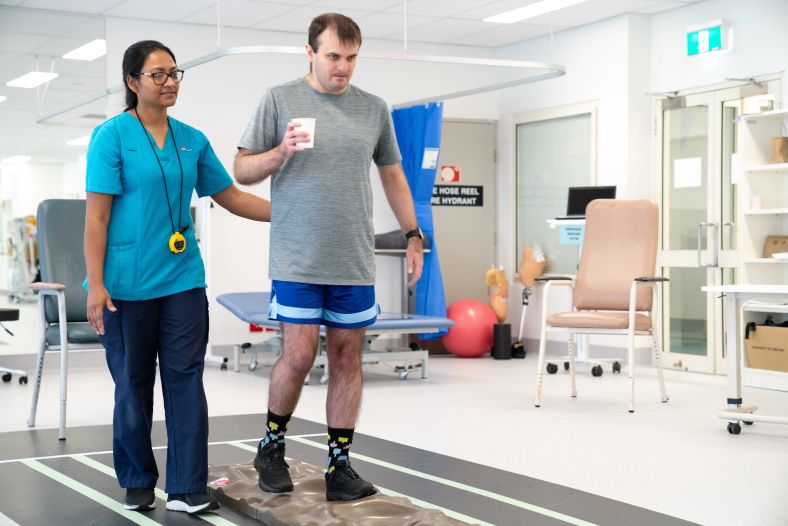Even while adjusting to life with the ongoing challenges of a disabling neurological condition, Ricky McGrath has drawn on his recovery experience at Nepean Hospital to make important contributions to clinical education from the patient perspective.

Ricky McGrath during a session at Nepean Hospital’s Rehabilitation Gym
In 2020, after experiencing some unusual symptoms, Ricky McGrath was diagnosed with a rare form of cerebellar ataxia; damage to the part of the brain responsible for coordinating movement and balance.
“I first started noticing symptoms such as fatigue and balance issues, like stumbling and bumping into walls,” recalls Ricky.
After worsening symptoms and subsequent neurological examinations, it was eventually found that Ricky’s condition was caused by an autoimmune disorder relating to GAD 65 antibodies, which are also associated with more common conditions such as Type 1 diabetes.
Struggling with a rare and poorly understood diagnosis, along with increasingly reduced mobility, Ricky experienced depression, anxiety and loss of confidence.
There are no easy answers, and I got fairly depressed.” shares Ricky.
“When you get diagnosed with something rare, you don’t get very much information about where you’ll end up or what support you might receive.”
“I wondered would I have to use a walker for the rest of my life? What would my future look like? Would I be a burden to my family?”
Ricky McGrath
Recovery
Following surgery and a course of treatment to help his condition from worsening, Ricky underwent almost three years of rehabilitation with physiotherapists at Nepean Hospital.
“Ricky showed a lot of strength and perseverance,” says Sanzida Hoque, Physiotherapist Team Leader in Rehabilitation at Nepean Hospital.
“His journey included a lot of up and down, but he never gave up and worked with us at every step.”

Ricky is led through an exercise by his Physiotherapist, Sanzida Hoque, at Nepean Hospital
“Half the time it’s a mental challenge,” explains Ricky.
“My walking frame was a safety net, and it hindered my improvement. The physios at Nepean helped me build the confidence to put it aside.”
“That’s what I found most helpful – people encouraging me. They’re not just treating physical conditions, they’re touching lives.”
Ricky McGrath
Along with recovering his mobility, Ricky discovered a renewed sense of purpose.
“When I was first admitted the medical students came flocking in herds. They wanted to learn something from me and my condition,” Ricky recalls.
“I soon saw that if I could get anything out of this condition, it would be to help others; by allowing them to learn, and perhaps leading to better outcomes for patients.”
The power of patient experience
Since then, Ricky has drawn on his own experiences to help educate and inspire the next generation of physiotherapists.
In a presentation at Western Sydney University (available on YouTube), Ricky generates awareness of his condition and journey, while articulating how health professionals can make a meaningful difference to the lives of their patients.
“Physiotherapy has played a hugely important role in my recovery, and I can offer a long-term perspective,” explains Ricky.
From his first-hand experience, Ricky advocates for empathy, compassion, respect, and the celebration of milestones — no matter how small.
“I want all health professionals to embrace their responsibility with passion and dedication.”
Ricky McGrath
Ricky McGrath’s contributions to education and advocacy connect patient experience with professional health care in mutually beneficial ways.
“It’s really important to have patients like Ricky,” says Sanzida Hoque, Physiotherapist Team Leader in Rehabilitation at Nepean Hospital.
“The progress that Ricky made helps show what is possible, even when the journey is not straight-forward, and it was heart-warming to hear what Ricky shared with the students about his time at Nepean.”
“When patients are in hospital the focus can often be on the physical impairment and journey, so it’s great to hear what aspects of our holistic care had the biggest impact.”
Sanzida Hoque, Physiotherapist
Ricky has also taken opportunities to contribute to medical specialists’ training, using his experience to inform practical examinations conducted by the Royal Australasian College of Physicians (RACP).
“I’m probably never going to be able to do a triathlon or join a sports team, but doing this sort of advocacy and education really gives my life purpose,” says Ricky.
“It’s a contribution to myself, and to the community.”








